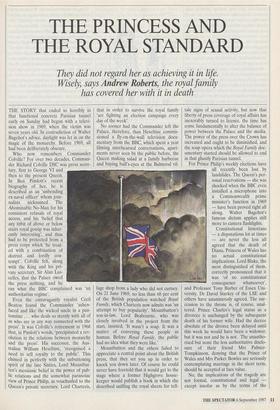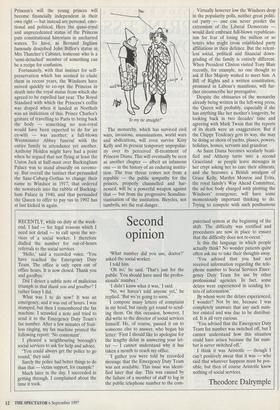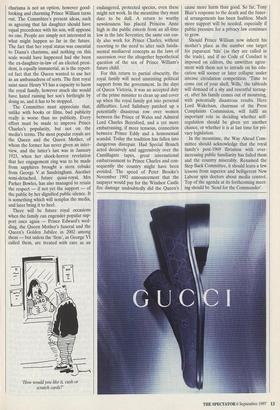THE PRINCESS AND THE ROYAL STANDARD
They did not regard her as achieving it in life.
has covered her with it in death
THE STORY that ended so horribly in that functional concrete Parisian tunnel early on Sunday had begun with a televi- sion show in 1969, when the victim was seven years old. In contradiction of Walter Bagehot's advice, daylight was let in on the magic of the monarchy. Before 1969, all had been deliberately obscure.
Who now remembers Commander Colville? For over two decades, Comman- der Richard Colville DSC was press secre- tary, first to George VI and then to the present Queen. In Ben Pimlott's recent biography of her, he is described as an 'unbending ex-naval officer' whom jour- nalists nicknamed The Abominable No-Man for his consistent refusals of royal access, and his 'belief that any titbit of above or below stairs royal gossip was inher- ently interesting', and thus had to be protected from a press corps which 'he treat- ed with a combination of distrust and lordly con- tempt'. Colville felt, along with the King and his pri- vate secretary, Sir Alan Las- celles, that the Palace owed the press nothing, and he ran what the BBC complained was 'an authoritarian regime'.
Even the extravagantly royalist Cecil Beaton found the Commander 'ashen- faced and like the wicked uncle in a pan- tomime . . . who deals so sternly with all of us who are in any way connected with the press'. It was Colville's retirement in 1968 that, in Pimlott's words, 'precipitated a rev- olution in the relations between monarchy and the press'. His successor, the Aus- tralian William Heseltine, 'recognised a need to sell royalty to the public'. This chimed in perfectly with the unbuttoning spirit of the late Sixties, Lord Mountbat- ten's messianic belief in the power of pub- lic relations and the somewhat paranoiac view of Prince Philip, as vouchsafed to the Queen's private secretary, Lord Charteris, that in order to survive the royal family `are fighting an election campaign every day of the week'.
No sooner had the Commander left the Palace, therefore, than Heseltine commis- sioned a fly-on-the-wall television docu- mentary from the BBC, which spent a year filming unrehearsed conversations, apart- ments never seen by the public before, the Queen making salad at a family barbecue and buying bull's-eyes at the Balmoral vil- lage shop from a lady who did not curtsey. On 21 June 1969, no less than 68 per cent of the British population watched Royal Family, which Charteris now admits was 'an attempt to buy popularity'. Mountbatten's son-in-law, Lord Brabourne, who was closely involved in the project from the start, insisted, 'It wasn't a soap. It was a matter of conveying these people as human. Before Royal Family, the public had no idea what they were like.'
Mountbatten and the others failed to appreciate a central point about the British press, that they set you up in order to knock you down later. Of course he could never have foretold that it would get to the stage where a former Highgrove house- keeper would publish a book in which she described sniffing the royal sheets for tell- tale signs of sexual activity, but now that liberty of press coverage of royal affairs has inexorably turned to licence, the time has come fundamentally to alter the balance of power between the Palace and the media. The power of the press over the Crown has increased and ought to be diminished, and the soap opera which the Royal Family doc- umentary started should be allowed to end in that ghastly Parisian tunnel.
For Prince Philip's weekly elections have all recently been lost by landslides. The Queen's per- sonal reservations — she was shocked when the BBC even installed a microphone into a Commonwealth prime minister's function in 1969 — have been proved right all along. Walter Bagehot's famous dictum applies still more to camera flashlights.
Constitutional historians — a disputatious lot at times — are never the less all agreed that the death of Diana, Princess of Wales has no actual constitutional implications. Lord Blake, the most distinguished of them, correctly pronounced that it was 'of no constitutional consequence whatsoever', and Professor Tony Barber of Essex Uni- versity, Dr David Starkey of the LSE and others have unanimously agreed. The suc- cession to the throne is, of course, unal- tered. Prince Charles's legal status as a divorcee is unchanged by the subsequent death of his former wife. Had the decree absolute of the divorce been delayed until this week he would have been a widower; but it was not and he is not. The unautho- rised but none the less authoritative disclo- sure of their friend Mrs Palmer- Tompkinson, denying that the Prince of Wales and Mrs Parker Bowles are seriously contemplating marriage in the short term, should be accepted at face value.
No, the implications of the tragedy are not formal, constitutional and legal except insofar as by the terms of the Princess's will the young princes will become financially independent in their own right — but instead are personal, emo- tional and political. Here the quasi-royal and unprecedented status of the Princess puts constitutional historians in uncharted waters. To have, as Bernard Ingham famously described John Biffen's status in Mrs Thatcher's Cabinet, someone who is a `semi-detached' member of something can be a recipe for confusion.
Fortunately, with that instinct for self- preservation which has seemed to elude them in recent years, the Windsors have moved quickly to co-opt the Princess in death into the royal status from which she agreed to be expelled last year. The Royal Standard with which the Princess's coffin was draped when it landed at Northolt was an indication of this. Prince Charles's gesture of travelling to Paris to bring back the body — something no non-royal would have been expected to do for an ex-wife — was another; a full-blown Westminster Abbey funeral with the entire family in attendance yet another. Anthony Holden might have had a point when he argued that not flying at least the Union Jack at half-mast over Buckingham Palace was to stand absurdly on ceremo- ny. But overall the instinct that persuaded the Saxe-Coburg-Gothas to change their name to Windsor in 1917, that ordered the newsreels into the rubble of Bucking- ham Palace in 1940, and that persuaded the Queen to offer to pay tax in 1992 has at last kicked in again. Is my tie straight?'
The monarchy, which has survived civil wars, invasions, assassinations, world wars and abdications, will even survive Kitty Kelly and its present temporary unpopular- ity over its perceived ill-treatment of Princess Diana. This will eventually be seen as another chapter — albeit an infamous one — in the history of an enduring institu- tion. The true threat comes not from a republic — the public sympathy for the princes, properly channelled and har- nessed, will be a powerful weapon against that — but from the progressive Scandina- vianisation of the institution. Bicycles, not tumbrils, are the real danger. Virtually however low the Windsors drop in the popularity polls, neither great politi- cal party — one can never predict the extremism of the Liberal Democrats would dare embrace full-blown republican- ism for fear of losing the million or so voters who might cross established party affiliations in their defence. But the relent- less social, political and financial down- grading of the family is entirely different. When President Clinton visited Tony Blair recently, for example, no one thought to ask if Her Majesty wished to meet him. A Bill of Rights and a written constitution, promised in Labour's manifesto, will fur- ther circumscribe her prerogative.
Despite the obituaries of the monarchy already being written in the left-wing press, the Queen will probably, especially if she has anything like her mother's longevity, be looking back in two decades' time and agreeing with Mark Twain that the reports of its death were an exaggeration. But if the Chippy Tendency gets its way, she may be doing so shorn of yachts, planes, powers, holidays, homes, servants and grandeur.
As Saint Diana becomes secularly beati- fied and Althorp turns into a second Graceland, as people leave messages in her crypt asking her to cure their ailments, and she becomes a British amalgam of Grace Kelly, Marilyn Monroe and Evita, the royal family's Way Ahead Committee, the ad-hoc body charged with plotting the Windsors' resurgence, will have some momentously important thinking to do. Trying to compete with such posthumous charisma is not an option, however good- looking and charming Prince William turns out. The Committee's present ideas, such as agreeing that his daughter should have equal precedence with his son, will appease no one. People are simply not interested in what might happen so far in the future. The fact that her royal status was essential to Diana's charisma, and nothing on this scale would have happened had she been the ex-daughter-in-law of an elected presi- dent, is equally immaterial, as is the report- ed fact that the Queen wanted to use her as an ambassadress of sorts. The first royal saint since Henry VI has a capacity to harm the royal family, however much she would have hated ruining her son's birthright by doing so, and it has to be stopped.
The Committee must appreciate that, unlike with books or films, bad publicity really is worse than no publicity. Every effort must be made to improve Prince Charles's popularity, but not on the media's terms. The most popular royals are the Queen and the Queen Mother, of whom the former has never given an inter- view, and the latter's last was in January 1923, when her shock-horror revelation that her engagement ring was to be made from sapphires brought a stern rebuke from George V at Sandringham. Another semi-detached, future quasi-royal, Mrs Parker Bowles, has also managed to retain the respect — if not yet the support — of the public by her dignified public silence. It is something which will nonplus the media, and later bring it to heel.
There will be future royal occasions when the family can engender popular sup- port once again — Prince Edward's wed- ding, the Queen Mother's funeral and the Queen's Golden Jubilee in 2002 among them — but unless the 'firm', as George VI called them, are treated with care as an `How would you like it, cash or scratch cards?' endangered, protected species, even these might not work. In the meantime they must dare to be dull. A return to worthy newslessness has placed Princess Anne high in the public esteem from an all-time low in the late Seventies; the same can eas- ily also work for Prince Charles, without resorting to the need to alter such funda- mental mediaeval concepts as the laws of succession over the altogether hypothetical question of the sex of Prince William's future child.
For this return to partial obscurity, the royal family will need unstinting political support from the government. In the days of Queen Victoria, it was an accepted duty of the prime minister to clean up and cover up when the royal family got into personal difficulties. Lord Salisbury patched up a potentially disastrous row over women between the Prince of Wales and Admiral Lord Charles Beresford, and a yet more embarrassing, if more tenuous, connection between Prince Eddy and a homosexual scandal. Today the tradition has fallen into dangerous disrepair. Had Special Branch acted decisively and aggressively over the Camillagate tapes, great international embarrassment to Prince Charles and con- sequently the country might have been avoided. The speed of Peter Brooke's November 1992 announcement that the taxpayer would pay for the Windsor Castle fire damage undoubtedly did the Queen's cause more harm than good. So far, Tony Blair's response to the death and the funer- al arrangements has been faultless. Much more support will be needed, especially if public pressure for a privacy law continues to grow.
Should Prince William now inherit his mother's place as the number one target for paparazzi 'hits' (as they are called in the trade), and if no Code of Conduct is imposed on editors, the unwritten agree- ment with them not to intrude on his edu- cation will sooner or later collapse under intense circulation competition. 'Time to come out of your shell, Wills,' the tabloids will demand of a shy and resentful teenag- er, after his family comes out of mourning, with potentially disastrous results. Here Lord Wakeham, chairman of the Press Complaints Commission, will fulfil an important role in deciding whether self- regulation should be given yet another chance, or whether it is at last time for pri- vacy legislation.
In the meantime, the Way Ahead Com- mittee should acknowledge that the royal family's post-1969 flirtation with ever- increasing public familiarity has failed them and the country miserably. Renamed the Step Back Committee, it should learn a few lessons from superior and belligerent New Labour spin doctors about media control. Top of the agenda at its forthcoming meet- ing should be 'Send for the Commander'.




























































 Previous page
Previous page